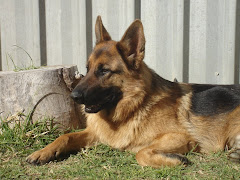There are several views on dog training around. One is that dogs have been domesticated for so long that the old pack concept and 'alpha' dog/person relationships are irrelevant to today's pampered Fido. The other is that the idea of the pack is still ingrained in the pet dog and influences its every action. Each method also differs vastly in how the dog is trained.
If you follow the first method, any kind of negative instruction is forbidden, and only rewards and affection are appropriate to give the learning dog. If you adhere more to the second concept, your relationship with the dog must be established and reinforced first before any 'training', including rewards, can begin.
In our 3 years with Jack, we've come to believe more and more in the inate pack mentality of the dog - big or small. The claim of some dog trainers that dogs no longer have inate wild behaviours seems to be contradicted by many unlearned but shared behaviours. Jack never saw another dog bury a bone, yet began to do this himself at a few months old. Jack never learnt to pee lifting one leg, or to mark trees, yet began to do this at 2 years. Some behaviours still seem ingrained in the dog, that only have relevance in a wild pack situation. There is no need for Jack to bury his bone in the yard - no other animal is going to take it from him, and he will get another one tomorrow - yet he continues to do so.
More importantly is the dog's relationship to its 'pack'. While for wolves or wild dogs this is their family group, for the domestic dog it is its human family. And while the dog will show loyalty to death to its pack, it also needs to know where it fits in. For the dog, the shifting and establishing of its role within the pack is the point of life. And most 'bad' dog behaviours, from biting and excessive barking, to pulling on the lead on a walk, extend from the dog's confusion over its place within the pack.



 Blonde fair-skinned Evie is quite gentle and quiet. She likes to wait until she can do something perfectly before trying it. She sits on her own now, but doesn't like being on her tummy or rolling. She loves books and has really taken to solid food. Dark haired olive skinned Minky is a little gymnast and won't be still long enough to learn to sit. She rolls everywhere and is trying to crawl. While Evie will sometimes chat away, Minky never stops talking, often loudly. Both laugh a lot and love songs and stories. We're really looking forward to them laughing at each other and to some of their getting up to double mischief.
Blonde fair-skinned Evie is quite gentle and quiet. She likes to wait until she can do something perfectly before trying it. She sits on her own now, but doesn't like being on her tummy or rolling. She loves books and has really taken to solid food. Dark haired olive skinned Minky is a little gymnast and won't be still long enough to learn to sit. She rolls everywhere and is trying to crawl. While Evie will sometimes chat away, Minky never stops talking, often loudly. Both laugh a lot and love songs and stories. We're really looking forward to them laughing at each other and to some of their getting up to double mischief.














 Weekend away in the city, Amora Hotel:
Weekend away in the city, Amora Hotel:






